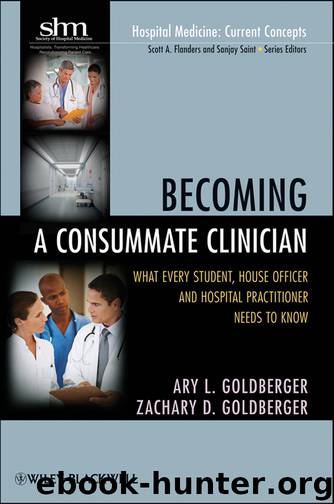Becoming a Consummate Clinician by Goldberger Ary L. Goldberger Zachary D. & Zachary D. Goldberger

Author:Goldberger, Ary L., Goldberger, Zachary D. & Zachary D. Goldberger
Language: eng
Format: epub
Publisher: Wiley
Published: 2012-07-05T04:00:00+00:00
Yet intuitions can also be wildly off base, to use another baseball metaphor, and constitute only one component of clinical assessment, which must be carefully validated and tested. Thus, a key skill to develop so as not to miss diagnoses is the complementary and essential ability to consider all of the other possibilities when thinking about diagnosis, etiology, and therapy. Sometimes our first impressions—the blinks—are dreadfully wrong or, at the very best or least, incomplete.
Dr. Jerome Groopman at Harvard Medical School has written eloquently about this competing challenge between intuition and reflection in his book How Doctors Think. As noted by Dr. Groopman: “Doctors must be wary of ‘going with your gut’ when what’s in your gut is a strong emotion about a patient, even a positive one. This species of ‘affective bias’ can skew a physician’s judgment and lead to misdiagnoses.”
Another mechanism of misdiagnosis has been called confirmation bias or anchoring. As Dr. Groopman explains: “Anchoring is a shortcut in thinking where a person doesn’t consider multiple possibilities but quickly and firmly latches on to a single one, sure that he has thrown his anchor down just where he needs to be.” Clinicians therefore need to cultivate an approach that incorporates simultaneously two tendencies that are seemingly at odds with each other: intuition and systematic thinking. This competition could be referred to as the glimpse vs. the gaze.
In actuality, this either–or distinction is itself an oversimplification. In addition to quick and longer looks, clinicians need to cultivate a third modality of seeing: the re-look—the self-imposed intellectual discipline to revisit first, second, and even third impressions and to be open to the “possibility of other possibilities.” In medicine, these other possibilities include diagnoses not yet considered and, in rare but path-breaking cases, new syndromes and diseases that remain to be discovered, or novel presentations of known pathologies.
Keep in mind that not too long ago the first recognized cases of HIV/AIDS, severe acute respiratory syndrome (SARS), and the Brugada syndrome were reported. One of the most exciting facets of clinical medicine is that the next patient you admit to your service or see in the clinic might fall into the latter group of about-to-be-recognized diseases or reportable presentations. Most exciting is that such discoveries are as open to medical students as they are to seasoned clinicians.
Finally, as noted by Dr. Groopman:
A technique to foster this type of critical thinking is for clinicians to develop a routine, much like they prescribe for exercise protocols. The idea of a routine here is not intended to foster a reflexive type of predictability. Rather, it is intended to encourage “out of the box” thinking by opening up the number of options being considered, and by encouraging the search for alternative explanations.
Download
This site does not store any files on its server. We only index and link to content provided by other sites. Please contact the content providers to delete copyright contents if any and email us, we'll remove relevant links or contents immediately.
| Administration & Medicine Economics | Allied Health Professions |
| Basic Sciences | Dentistry |
| History | Medical Informatics |
| Medicine | Nursing |
| Pharmacology | Psychology |
| Research | Veterinary Medicine |
Good by S. Walden(3543)
The Social Psychology of Inequality by Unknown(3013)
The Checklist Manifesto by Atul Gawande(2843)
0041152001443424520 .pdf by Unknown(2842)
Get What's Yours for Medicare: Maximize Your Coverage, Minimize Your Costs by Philip Moeller(2577)
The Meaning of the Library by unknow(2563)
Guns, Germs and Steel by Diamond Jared(2363)
Borders by unknow(2300)
23:27 by H. L. Roberts(2245)
And the Band Played On by Randy Shilts(2185)
Being Mortal: Medicine and What Matters in the End by Atul Gawande(2103)
A Leg to Stand On by Oliver Sacks(2031)
The Hot Zone by Richard Preston(2008)
More Than Words (Sweet Lady Kisses) by Helen West(1851)
The Valachi Papers by Peter Maas(1843)
The Laws of Medicine by Siddhartha Mukherjee(1788)
The Andromeda Strain by Michael Crichton(1740)
The Obesity Epidemic by Robyn Toomath(1663)
Get What's Yours for Medicare by Philip Moeller(1656)
